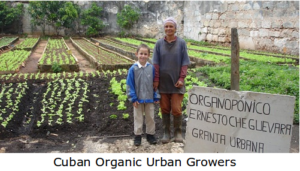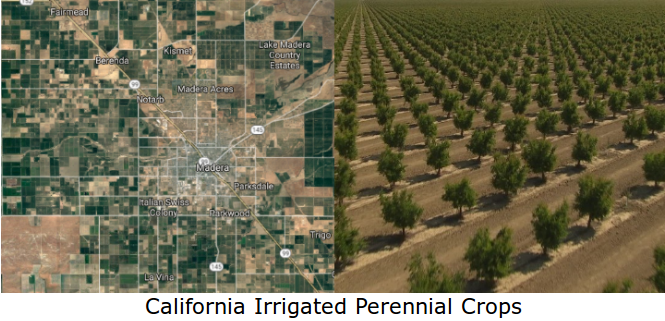A recent report by the University of California Merced and published in Agronomy projects that climate disruption will have huge impacts on our food supply of California almonds, pistachios, oranges, apricots, nectarines and prunes, more than a third of our vegetables, including artichokes, broccoli, spinach and carrots and other food crops. Climate related impacts include the following: fluctuation and extremes of rainfall and floods, less Sierra snowpack resulting in less irrigation, Summer heat waves, greater susceptibility to disease, fewer Winter chilling days required to break seed dormancy, and fewer bees to pollinate crops.
Shorter chill seasons will make vast areas no longer suitable for chestnuts, pecans, apricots, kiwis, apples, cherries and pears. Severe heat waves will reduce yields of wine grapes, strawberries and walnuts. With lower bee populations, pollination will be compromised for almonds, apples, avocados, cashews, chestnuts, citrus, pears, and many vegetables and small fruits including grapes and strawberries. The report states that “By the end of this century, the shrinking winter chill period will reduce the acreage of the Central Valley suitable for chestnut, pecan and quince by 22%, and for apricot, peach, nectarine and walnut by more than half. By 2000, only 4% of the Central Valley was suitable for apples, cherries and pears, but none of that will be left by 2060 under almost any climate change scenario” – You can kiss much of California’s agriculture goodbye because of climate change..

A related report by the United Nations Commission on Trade and Development (UNCTAD) titled “Wake Up Before It’s Too Late” gave warning five years ago about the importance of working simultaneously on climate disruption, food security, and agriculture. The report primarily addresses how to feed the world through organic agriculture. But in so doing, by definition, fossil fuels are eliminated from production and use in fertilizers, pesticides and herbicides. As states the report, “This implies a rapid and significant shift from conventional, monoculture-based and high-external-input-dependent industrial production toward a mosaics of sustainable, regenerative production systems that also considerably improve the productivity of small-scale farmers”. With drastically decreased or eliminated fossil fuel use, there will be multiple benefits for the climate, the land, and the people: increased soil carbon content, lower greenhouse gas emissions, more extensive agroforestry and uptake of CO2, greater use of organic fertilizer in a closed nutrient cycle, cleaner streams and groundwater, and healthier and more self-reliant communities. The take home message is that “Organic and small-scale farming is the answer for feeding the world”. Learn more at – Urgent agricultural message from United Nations: Wake up before it’s too late.


Recent Comments